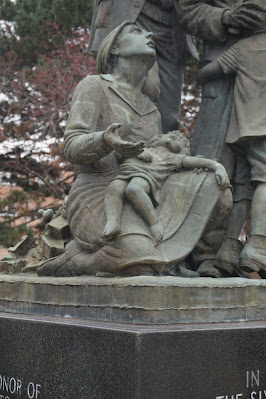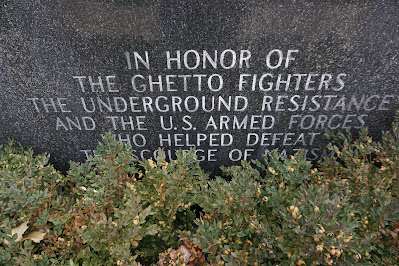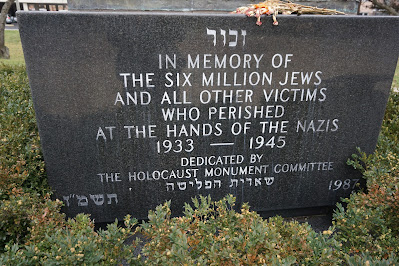 | |
Skokie, Illinois. Holocaust Monument on Village Green, Bert J. Gast, designer and Edward Chesney, sculptor. Dedicated 1987. Photo: Samuel D.Gruber 2021. | |
 |
| Skokie, Illinois. Holocaust Monument on Village Green. Dtl of Ghetto rubble. Bert J. Gast, designer and Edward Chesney, sculptor. Dedicated 1987. Photo: Samuel D.Gruber 2021. |
Skokie Holocaust Monument: A Return to "Realism" in Holocaust Remembrance
by Samuel D. Gruber
For the past year I have been working on a collaborative project with the International Survey of Jewish Monuments, the Center for Jewish Art at Hebrew University and the Sue and Leonard Miller Center for Contemporary Judaic Studies at the University of Miami, to design a database and searchable website to present hundreds - and eventually of thousands - of Holocaust memorial monuments around the world. Part of this project is just to document and save information - a very big and necessary task. But even a small collection of Holocaust Memorial Monuments gives considerable insight into have different communities and different countries have faced the legacy of the Holocaust, and how they interpret and present individual events and the collective horror of the Nazi destruction of Jewish life in much of Europe. You'll be hearing a lot more about this project in coming months.
As we have been develping the prototype of the database, I've been looking more closely at all types of memorial monuments, and also going out of my way when possible to visit them. There hasn't been much travel during the pandemic, but when I was in Chicago in December, I did make it to nearby Skokie, to see firsthand the well-known statue dedicated in 1987. When I was last in Skokie I went directly to the Holocaust Museum there, and missed this memorial completely. The statue is really made for local people, especially Survivors, while the museum serves a much wider population as an educational center especially for young people.
 |
| Skokie, Illinois. Holocaust Monument on Village Green, Bert J. Gast, designer and Edward Chesney, sculptor. Dedicated 1987. Photo: Samuel D.Gruber 2021. |
 |
| Skokie, Illinois. Holocaust Monument on Village Green, Bert J. Gast, designer and Edward Chesney, sculptor. Dedicated 1987. Photo: Samuel D.Gruber 2021. |
This Holocaust memorial monument of a group of ghetto fighters and survivors is not my preferred style - but this type of emotional realism, or at least representation, is anecdotally the most popular form of memorial presentation. The statue was made in the 1980s when new Holocaust and Tolerance museums were gearing up for participatory programs (as if one can really ever "participate" or "reenact" experiences of the Holocaust). Films at the time were increasing grpahic, too, in their depiction of Holocaust violence. After several decades of increasing abstract and conceptional memorials, there was strong return to trying to humanize the Holocaust experience, to make numbers into real people, and to link big ideas to experiences of action and suffering. The designer here has used old artistic tropes, but he's trying to convey the events of people rather than explain processes or preach ideals.
This is a return to the memorial preferences of the years immediately after the defeat of the Nazis and the liberation of camps. We see it in many monuments of the 1940s and 1950s, some of which I've wirtten about previously, such as the Warsaw Ghetto Uprising Monument and the Mauthausen Memorial in Paris. Another example from the early 1990s is the "Vel 'Hiv" Memorial in Paris, which has been frequently criticized for its lack of Jewish identifiers. both Skokie and Paris include the traditional and now-requisite figures of a mother and child.
Seeing human figures - and especially mothers and children - arouses real emotions. These can be positive - and this is a monument about resilience. Or they can be negative. The monument was vandalized the very day is was inaugurated in 1987, though obviously by an anti-Semitic Holocaust denier, not an art critic.Ironically, because of that shocking defacement, the monument has taken a greater stature in Holocaust remembrance than it might have otherwise.
 |
| Skokie, Illinois. Holocaust Monument on Village Green, Bert J. Gast, designer and Edward Chesney, sculptor. Dedicated 1987. Photo: Samuel D.Gruber 2021. |
The monument was dedicated May 3, 1987 on the Village Green of Skokie, between Skokie Village Hall and the Skokie Public Library. The other sculpture on the Village Green is placed there as art, without historical or commemorative purpose. Skokie was selected because when the monument was installed, Village officials estimated that 7,000 of Skokie`s 69,000 were Holocaust survivors. The monument primarily commemorates resilience, rather than mourning extreme loss. It is officially dedicated to Ghetto fighters, the underground resistance, the U.S. Armed Forces who helped defeat the scourge of Nazism and the six million Jews and all other victims who perished at the hands of the Nazis.
 |
| Skokie, Illinois. Holocaust Monument on Village Green, Bert J. Gast, designer and Edward Chesney, sculptor. Dedicated 1987. Photo: Samuel D.Gruber 2021. |
 |
| Skokie, Illinois. Holocaust Monument on Village Green, Bert J. Gast, designer and Edward Chesney, sculptor. Dedicated 1987. Photo: Samuel D.Gruber 2021. |
The bronze figurative sculpture designed by Bert J. Gast and sculpted by Edward Chesney depicts four individuals during the 1943 Warsaw Ghetto uprising. The group consists of a Jewish resistance fighter (identified by his bandolier), a mother holding a dead child, and a small boy with kippah who clings to an older bearded man dressed in more traditional garb. The feet of the figures rest on ruins of the Ghetto including scattered bricks and other building rubble, and a damaged Torah scroll.
At the bottom of the statue amidst this depiction of ruin is inscribed: "Thou shallt not kill." The bronze group is set on a black marble base with inscriptions in English and Hebrew on all sides. A separate free-standing bronze plaque with information about the history of the memorial is set next to monument.
 |
| Skokie, Illinois. Holocaust Monument on Village Green, Bert J. Gast, designer and Edward Chesney, sculptor. Dedicated 1987. Photo: Samuel D.Gruber 2021. |



1 comment:
My sister in law, aged 91, is the last of her generation to remember the camps from personal experience. So even though I have heard every story and read every history, realism in sculpture has become increasingly imortant.
Even generic plaques, with dates and place names, need more information.
Post a Comment